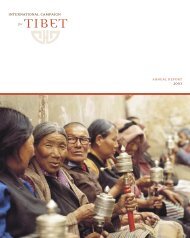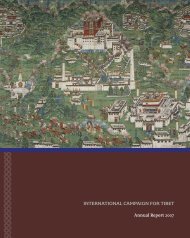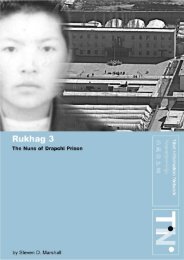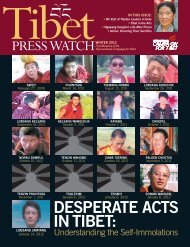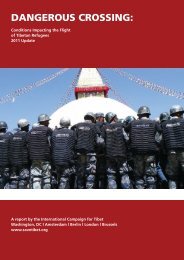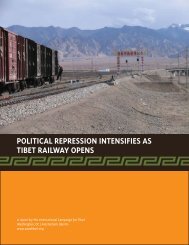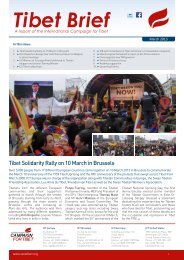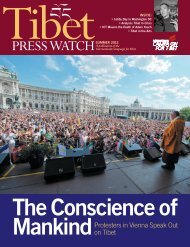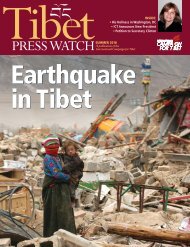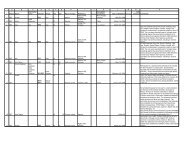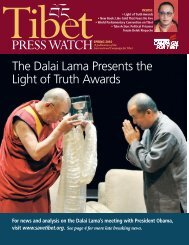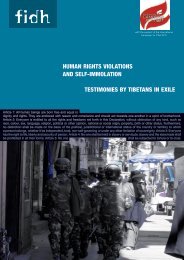download the report - International Campaign for Tibet
download the report - International Campaign for Tibet
download the report - International Campaign for Tibet
You also want an ePaper? Increase the reach of your titles
YUMPU automatically turns print PDFs into web optimized ePapers that Google loves.
INTERNATIONAL CAMPAIGN FOR TIBET<br />
Like <strong>Tibet</strong>ans, <strong>the</strong> Uyghur people have in recent decades faced prolonged and relentless<br />
pressure on <strong>the</strong>ir cultural identity, in large part due to <strong>the</strong> influx of settlers from<br />
<strong>the</strong> Chinese mainland, but also due to government policies intended to severely curtail<br />
and control cultural and religious activities (most Uyghurs are Muslim). As with<br />
Buddhism in <strong>Tibet</strong>, <strong>the</strong> moderate and permissive <strong>for</strong>ms of Islam that prevail in Xinjiang<br />
are seen as integral to Uyghur nationalism, and Uyghur nationalism is readily depicted<br />
by <strong>the</strong> Chinese authorities as being dangerously close to global jihad<br />
movements. Profound cultural differences between <strong>the</strong> Han and Uyghur peoples,<br />
ranging from language through to diet and dress, are perhaps best exemplified by <strong>the</strong><br />
fact that while Chinese settlers set <strong>the</strong>ir watches to standard Beijing time, Uyghurs<br />
tend to set <strong>the</strong>irs to local time, some two hours later.<br />
With over six years of experience in <strong>the</strong> XUAR, Zhang Qingli was installed as acting<br />
Party Secretary of <strong>the</strong> TAR in November 2005 after his predecessor, Yang Chuantang<br />
left <strong>the</strong> post prematurely due to illness. Zhang was confirmed as Party Secretary in<br />
<strong>the</strong> TAR in May 2006. While it would be misleading to place too much emphasis on<br />
Zhang Qingli’s personal impact on <strong>Tibet</strong> policy, as <strong>Tibet</strong> policy is set in Beijing, it can<br />
be observed that during his tenure he has attempted to characterise <strong>Tibet</strong>an nationalism<br />
in <strong>the</strong> same ‘terrorist’ light as Beijing depicts <strong>the</strong> Uyghur resistance against Chinese<br />
rule. This seems to have in<strong>for</strong>med some of <strong>the</strong> more extreme statements about<br />
organized <strong>Tibet</strong>an opposition: <strong>for</strong> instance, <strong>the</strong> <strong>Tibet</strong>an Youth Congress (TYC), an<br />
organization based in India which <strong>the</strong> Chinese authorities claim was behind <strong>the</strong><br />
protests in Lhasa and elsewhere in <strong>Tibet</strong>, is described in China’s official media as an<br />
organization “worse than Bin Laden’s”. 9 The TYC denies that it has a “terrorist” agenda,<br />
stressing that it supports non-violence, and <strong>the</strong> Chinese authorities have not provided<br />
any evidence to suggest o<strong>the</strong>rwise.<br />
Zhang Qingli’s ideological position is in <strong>the</strong> tradition of previous Party hardliners in<br />
<strong>Tibet</strong> — such as Chen Kuiyuan, who served as TAR Party Secretary from 1992 to 2000<br />
— in that that <strong>the</strong> Party is engaged in a “life and death struggle” with <strong>the</strong> Dalai Lama<br />
and his supporters. 10 This is provided as justification <strong>for</strong> <strong>the</strong> implementation of a<br />
more intense patriotic education campaign in monasteries, nunneries and in <strong>the</strong><br />
wider <strong>Tibet</strong>an society. In <strong>the</strong> early days of <strong>the</strong> protests from March 10, 2008, one of <strong>the</strong><br />
grievances of monks in Lhasa who took to <strong>the</strong> streets was <strong>the</strong> impact of this ideological<br />
campaign and its stifling of religious practice.<br />
This demand <strong>for</strong> intensified patriotic education set <strong>the</strong> tone <strong>for</strong> Zhang’s continued<br />
tenure in <strong>the</strong> TAR. While statements and edicts banning, <strong>for</strong> example, government<br />
workers — serving and retired — as well as students and all Party members from ob-<br />
101



